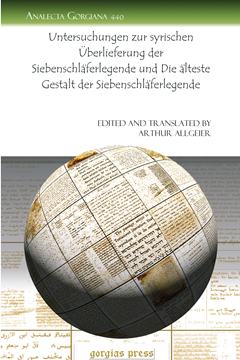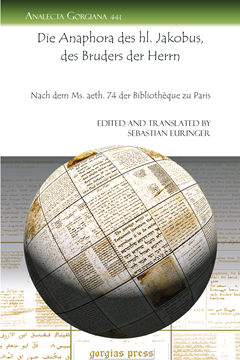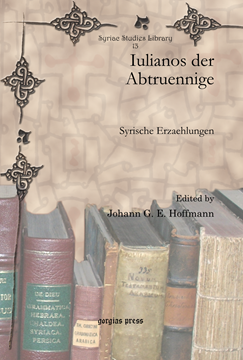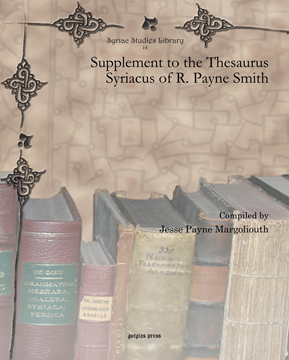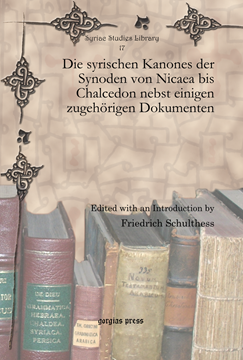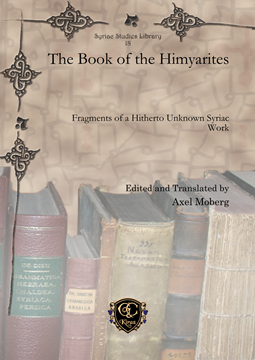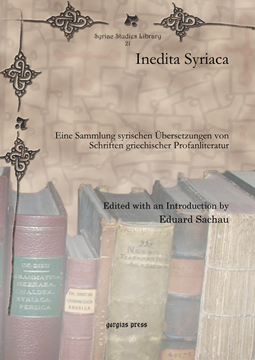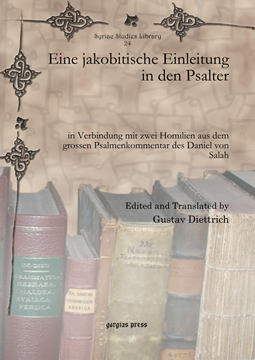Untersuchungen zur syrischen Überlieferung der Siebenschläferlegende und Die älteste Gestalt der Sie
Edited and Translated by Arthur Allgeier
Series: Analecta Gorgiana 440
ISBN: 978-1-60724-777-7
Arthur Allgeier publishes here two articles concerning the “Legend of the Seven Sleepers” in the Syriac tradition. The first article includes a discussion of the text’s transmission history and the second includes the Syriac text, German translation, and apparatus.
$72.00 (USD) $43.20 (USD)
Die Anaphora des hl. Jakobus, des Bruders der Herrn
Nach dem Ms. aeth. 74 der Bibliothèque zu Paris
Edited and Translated by Sebastian Euringer
Series: Analecta Gorgiana 441
ISBN: 978-1-60724-778-4
Sebastian Euringer publishes here the Ethiopic text and German translation of an anaphora attributed to James, the brother of Jesus.
$36.00 (USD) $21.60 (USD)
Iulianos der Abtruennige
Syrische Erzaehlungen
Edited by Johann G. E. Hoffmann
Series: Syriac Studies Library 13
ISBN: 978-1-60724-794-4
This work contains two Syriac texts bearing on the (in)famous Julian the Apostate, both in terms of history and religion. The book includes a critical apparatus to the Syriac texts and indices of proper names and Greek words.
$178.00 (USD) $106.80 (USD)
Supplement to the Thesaurus Syriacus of R. Payne Smith
Compiled by Jesse Payne Margoliouth
Series: Syriac Studies Library 14
ISBN: 978-1-60724-795-1
Jessie Payne Margoliouth here continues the work of her father’s Thesaurus Syriacus, including new words and meanings that had been discovered after publication of the Thesaurus. The Supplement gives definitions in English (not Latin).
$196.00 (USD) $117.60 (USD)
Die syrischen Kanones der Synoden von Nicaea bis Chalcedon nebst einigen zugehörigen Dokumenten
Edited with an Introduction by Friedrich Schulthess
Series: Syriac Studies Library 17
ISBN: 978-1-60724-813-2
This work contains the Syriac texts of the canons of church councils/synods from the fourth and fifth centuries. After a brief introduction, Schulthess presents the Syriac texts with a small number of critical notes.
$170.00 (USD) $102.00 (USD)
The Book of the Himyarites
Fragments of a Hitherto Unknown Syriac Work
Edited and Translated by Axel Moberg
Series: Syriac Studies Library 18
ISBN: 978-1-60724-814-9
The Book of the Himyarites, given in Syriac and English translation, deals with the growth of Christianity in Arabia. The introduction provides details about the historical value of the work and its relationship to other related sources.
$175.00 (USD) $105.00 (USD)
Un évêque-poète au Ve et au VIe siècles
Jacques de Saroug: sa vie, son temps, ses oeuvres, ses croyances
Series: Syriac Studies Library 20
ISBN: 978-1-60724-819-4
In this important work on Jacob of Sarug, Martin examines what is known of the poet’s life, looks at his lasting influence, offers a number of extracts from Jacob’s homilies and letters in French, and discusses his orthodoxy.
$143.00 (USD) $85.80 (USD)
Inedita Syriaca
Eine Sammlung syrischen Übersetzungen von Schriften griechischer Profanliteratur
Edited with an Introduction by Eduard Sachau
Series: Syriac Studies Library 21
ISBN: 978-1-60724-820-0
Using manuscripts from the British Museum, Sachau here presents a number of unique Syriac texts translated from Greek, including philosophical, medical, and maxim texts. The appendix includes astronomical texts from Sergius of Reshaina and Severus Sebokt.
$154.00 (USD) $92.40 (USD)
The Treatise of Dionysius bar Salibi Against the Jews
Edited by J de Zwaan
Series: Syriac Studies Library 23
ISBN: 978-1-60724-828-6
This volume contains the Syriac text of one of Dionysius bar Salibi’s polemical writings, that against the Jews, based on a manuscript now located at the Harvard Semitic Museum. An English translation was promised by the editor, but never appeared.
$137.00 (USD) $82.20 (USD)
Eine jakobitische Einleitung in den Psalter
in Verbindung mit zwei Homilien aus dem grossen Psalmenkommentar des Daniel von Salah
Edited and Translated by Gustav Diettrich
Series: Syriac Studies Library 24
ISBN: 978-1-60724-829-3
This volume contains the Syriac text, with German translation, of an (anonymous) introduction to the Psalms, together with two homilies from Daniel of Salah’s (fl. mid-6th century) long Psalms commentary. Diettrich’s detailed introduction adds richly to the work.
$167.00 (USD) $100.20 (USD)
